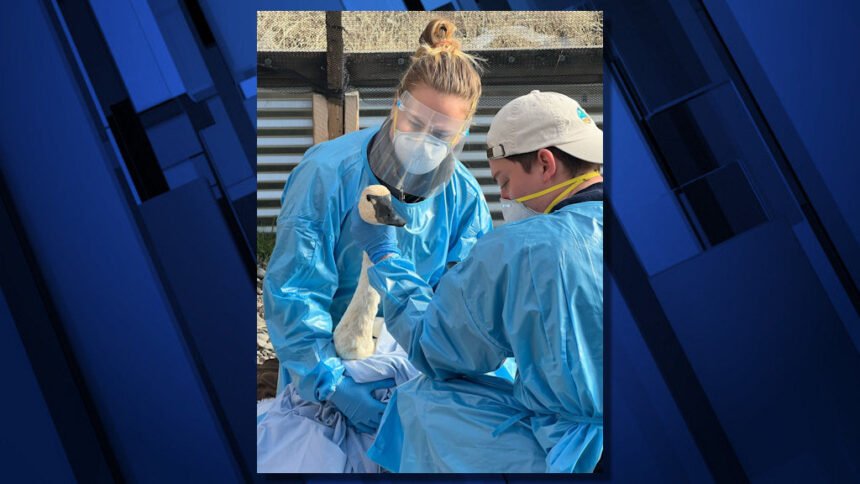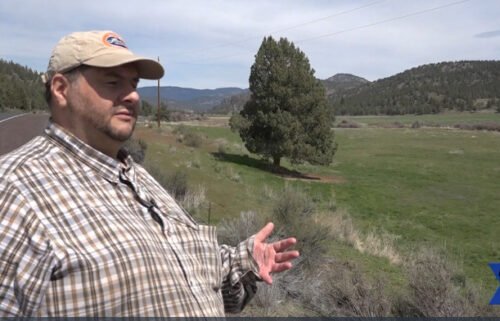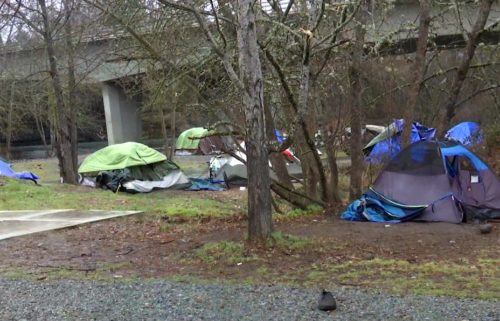Rescued tundra swan recovering at Bend’s Think Wild after mystery waterfowl ‘mass casualty event’ near Burns

(Update: Adding video)
Cause of deaths, injuries unknown, may be tied to lunar eclipse, snowstorm
BEND, Ore. (KTVZ) -- Think Wild, a Bend wildlife rehabilitation hospital, says a tundra swan now in their care was lucky to survive a casualty event that killed many other migrating waterfowl near Burns last week. Biologists think a lunar eclipse and snowstorm may have affected the birds’ ability to navigate successfully.
Here is Think Wild's full news release Tuesday on the incident and the swan brought to their facility:
Last Wednesday, Lee Foster, a district biologist with Oregon Department of Fish and Wildlife in Burns, reached out to Think Wild about the injured tundra swan. It was found in the town of Drewsey, among as many as 30 swans, geese, and other waterfowl that died during their fall migration.
Area biologists are unsure what caused this mass casualty event, but Foster hypothesized that a combination of the lunar eclipse and a snowstorm may have disoriented the migrating birds, causing them to fly into power lines, light posts or the ground.
While most of the found birds suffered fatal or non-repairable injuries, the surviving swan was non-flighted but did not have any obvious injuries. ODFW contacted Think Wild to arrange for medical care, and the next morning, Think Wild rescue and transport volunteer Karla Harris transported the swan to the wildlife hospital.
Think Wild veterinarian Dr. Laura Acevedo performed an exam and took radiographs of the tundra swan outdoors in the waterfowl enclosure, wearing masks, gloves, and surgical gowns to ensure biosecurity, as swans and other waterfowl can be carriers of the Highly Pathogenic Avian Influenza (HPAI).
“We found no significant fractures or injuries, but the swan does have bruising and likely soft tissue damage that will need time to heal,” said Dr. Acevedo. “Think Wild will provide ample space, food, medications for pain management, and time for recovery.”
Due to concerns about the Highly Pathogenic Avian Influenza (HPAI), Think Wild maintains strict biosecurity protocols in the wildlife hospital and is quarantining the Tundra Swan from other avian patients. The swan has shown no symptoms of the virus.
Because the casualties and injuries during the event were clearly caused by collisions with power lines and the ground, district biologists are fairly confident that HPAI is not a factor. Wildlife rehabilitators in the state are still prohibited from accepting waterfowl patients, except in rare cases such as this casualty event.
Tundra swans are large waterfowl native to North America. They spend their summers breeding and feeding in the Arctic tundra in northern Alaska and Canada, and migrate south to coastal estuaries, wetlands, and large lakes for the winter.
Tundra swans are most common in Central Oregon during fall and spring migrations, and can be spotted throughout the Willamette Valley and south into California’s Central Valley during the winter.
Migration routes can be long and dangerous for birds. Tundra swans migrate long distances, sometimes traveling day and night for as much as 1,000 miles at a time.
Climate trends toward larger, wetter storm systems on the West Coast during fall migration, as well as drought and habitat degradation, may affect tundra swans’ population success over time.[1] This year’s quick transition from unseasonably warm fall temperatures to freezing snowstorms may have contributed to the migration casualty event in Harney County last week.
###
About Think Wild
Think Wild is a 501(c)3 nonprofit organization located in Bend. Our mission is to inspire the High Desert community to care for and protect native wildlife through rescue and rehabilitation, outreach and education, and conservation. We provide veterinary treatment and care at the wildlife hospital, staffed by expert wildlife rehabilitation staff, animal husbandry volunteers, and our staff veterinarian. Wildlife conflicts or injuries can be reported to our Wildlife Hotline at (541) 241-8680, which is monitored seven days a week from 9 AM to 3 PM. Visit us online at thinkwildco.org, or on Instagram, Facebook, and Twitter @thinkwildco.
[1] https://ecos.fws.gov/ServCat/DownloadFile/36959?Reference=36942



